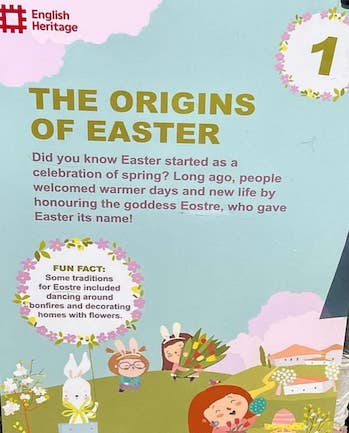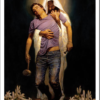English Heritage, a prominent UK charity responsible for many of the country’s historic sites, has come under fire for omitting the Christian roots of Easter in a booklet designed for children.
A booklet given out as part of a children’s Easter Adventure Quest at several of its historic sites does not mention Jesus or Christianity. The accompanying trail includes Easter eggs and bunny rabbits, yet nowhere mentions the Christian story of the Cross and the empty tomb which have been celebrated in England for 1,300 years. Easter celebration in England dates back to the 3rd and 4th century when Christianity began to spread in the British Isles during Roman rule.
Instead, the Easter Adventure Quest—hosted at locations like Whitby Abbey and Dover Castle – portrays the holiday as purely a springtime celebration, with references to the pagan goddess Eostre.
The material handed out to children states: “Easter started as a celebration of spring,” and credits Eostre with the holiday’s name, mentioning flower-decorating and bonfire dances – but not the death and resurrection of Jesus Christ.
The crux of the issue lies in the booklet’s focus on the Eostre theory, derived from the Venerable Bede’s 8th-century writings, which claims “Easter” originates from the goddess. However, this theory is not universally accepted, and the etymological roots of “Pascha” and “Pâques” in other languages, stemming from the Hebrew “Pesach” (Passover), suggest a different origin. Critics argue that English Heritage’s emphasis on pagan roots, while ignoring the core Christian celebration of Jesus Christ’s resurrection and its connection to Passover, constitutes a form of historical “whitewashing.”
Concerned visitors, including parents and educators, have voiced their disappointment.
Phil, the chairman of governors at a Catholic Primary School in Kent, posted a photograph of the notice on X after visiting an English Heritage property with his son.
He told The Telegraph: ‘There was no mention of Christ or Christianity in the English Heritage Easter children’s trail on any of the notices or the booklet.
‘There was no explanation of the Christian element. It had just been whitewashed out of the story. I appreciate the pagan side of the name’s origins, but it’s not the only part – Christianity is central to what Easter is. I had to explain to my 7-year-old son who Eostre was.’
Conservative councilor Joe Rich said on X: ‘English Heritage’s Origins of Easter poster is pathetic – erasing our Judeo-Christian roots in favour of an obscure eighth century god.
‘Roman records confirm Christ’s crucifixion at Passover long before any Anglo-Saxon celebrated Jesus’ Resurrection or ‘danced around bonfires’.’
Julie McNamee added on the platform: ‘I’m not a Christian but if you’re going to pretend to educate children you can at least have a passing mention of the Christian Easter story!’
In 2017, the National Trust was also accused of downplaying Christian heritage at some of its historic sites and events, again removing the term ‘Easter’ from promotional materials on an egg hunt. The decision was criticised by the Archbishop of York and the then Prime Minister Theresa May.
(Agencies; Picture Courtesy: Joe Rich Law/X)













